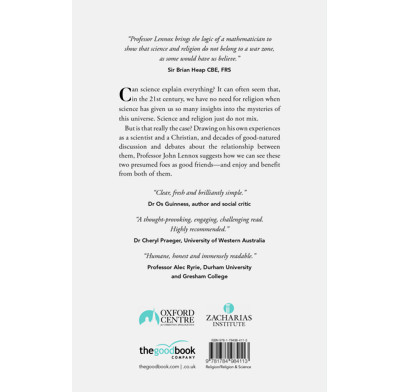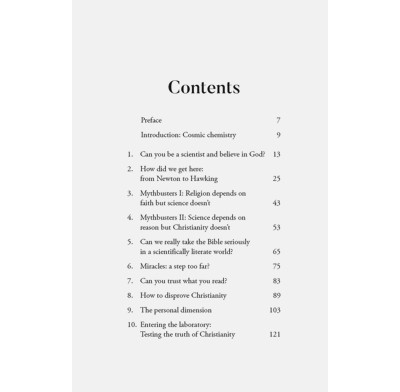📦 FREE shipping on orders over $30!



Evangelistic book looking at whether science and religion are opposed.
Part of the Questioning Faith series.
Can science explain everything? Many people think so. Science, and the technologies it has spawned, has delivered so much to the world: clean water; more food; better healthcare; longer life. And we live in a time of rapid scientific progress that holds enormous promise for many of the problems we face as humankind. So much so, in fact, that many see no need or use for religion and belief systems that offer us answers to the mysteries of our universe. Science has explained it, they assume. Religion is redundant.
Oxford Maths Professor and Christian believer John Lennox offers a fresh way of thinking about science and Christianity that dispels the common misconceptions about both. He reveals that not only are they not opposed, but they can and must mix to give us a fuller understanding of the universe and the meaning of our existence.
Introduction: Cosmic Chemistry
1. Can you be a scientist and believe in God?
2. How did we get here: from Newton to Hawking
3. Mythbusters I: Science
4. Mythbusters II: Christian faith
5. Can we really take the Bible seriously any more?
6. Miracles: a step too far?
7. Can you trust what you read?
8. How to disprove Christianity
9. The personal dimension
10. Entering the laboratory: testing the truth
| Contributors | John Lennox |
|---|---|
| ISBN | 9781784984120 |
| Format | eBook |
| First published | January 2019 |
| Language | English |
| Publisher | The Good Book Company |
Clear, fresh and brilliantly simple, John Lennox answers questions, dispels myths, and clarifies controversies like the seasoned master of the subject that he is—and all in an admirably irenic style. I highly recommend 'Can Science Explain Everything?'"
John Lennox is the ideal guide for those who wish to examine the relationship between science and religion. He himself combines a brilliant scientific mind with a strong Christian faith – and is a superb communicator. This book is a remarkable achievement: engaging with all the big issues in just a few pages, while remaining profound, accessible, engaging and, to my mind, completely compelling.
Humane, honest and immensely readable
'Can Science Explain Everything?' is an excellent introduction to the relationship between science and faith: it's short, accessible, and written with the skeptic in mind.... continue reading
Such is the extent to which Professor John Lennox turns the science and faith debate on its head in his book Can Science Explain Everything? In just 125 pages he thoroughly debunks the popular misconception that science and religion are necessarily at war with each other, showing that science in fact sits much more comfortably within the Christian worldview than in atheism.... continue reading
Oxford Maths Professor and Christian believer Prof. John Lennox offers a fresh way of thinking about science and Christianity that dispels the common misconceptions about both. He reveals that not only are they not opposed, but they can and must mix to give us a fuller understanding of the universe and the meaning of our existence.... continue reading
Professor Lennox gives a clear understandable summary of the close relationship between science and Christianity and in this short book commends to the reader the rationality of the Christian faith. His personal and winning style leads the reader to ask why have I so easily accepted the misconception that science and Christianity are incompatible. A good book to read with other works which explore the historical and archeological evidence for the birth of Christianity and the writings of the New Testament. Would thoroughly recommend it, whether a believer and searcher of the truth.
John Lennox is eminently well qualified to write on this subject! He explains clearly how Science and Christianity are not alternative ways of viewing the world, and that Science only addresses particular types of questions, but does not give us any answers about the meaning of life or why the world is the way it is. Christianity however is completely compatible with an understanding of Science, and many famous Scientists are also Christians, although of course others are atheists. He then discusses the evidence for the historical accuracy of much of the Bible, particularly the existence of Jesus as a historical character. He outlines the documentary evidence for the authenticity of the Bible documents which is much stronger than for most other ancient documents many of which we accept without question. He also discusses the strong evidence for the resurrection as the only reasonable explanation for the empty tomb. Finally he discusses how he has found Christianity to work as the basis for his own life. I found the book clear and easy to read, and his arguments were logical and convincing. I think it would be a helpful book for people who have a scientific outlook and are considering whether science is a sufficient explanation of life for them or whether there may be something more that makes life meaningful.
To set you thinking and strengthen your faith.
This is the short, clear, faithful, persuasive book that I've always wanted someone to write about the relationship between Christianity and Science. The case is bolstered further by the fact that it's written by a former Oxford University Professor of Mathematics too - not an easy author to dismiss out of hand.
My only minor quibble is that it ends too soon, and perhaps goes into the rational basis for Christianity too soon: I wanted more on the relationship between Christianity and Science.
This is an excellent book to give to the scientist in your life.